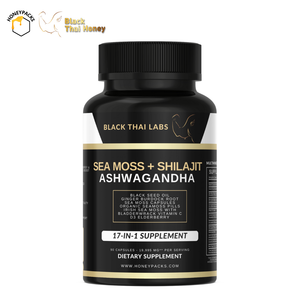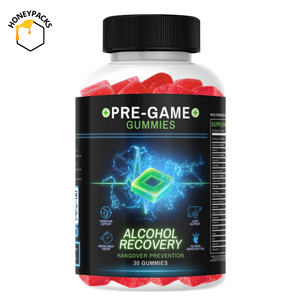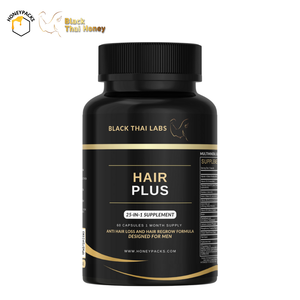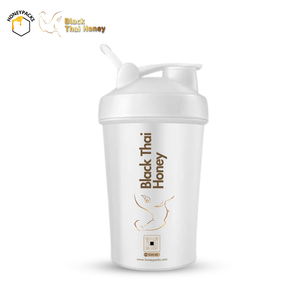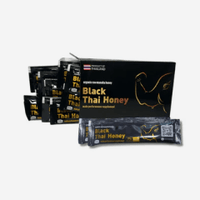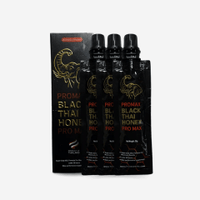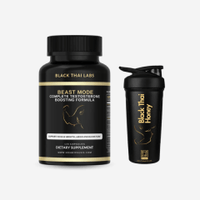Black Ginger for Diabetics | Benefits, Risks & Studies
Black ginger is not a cure for diabetes, but it may support blood flow, energy, and metabolic health. Regular ginger shows promise for blood sugar control when used consistently, especially alongside diet and movement.
That said, black ginger isn’t your typical kitchen spice, it’s a powerhouse herb used in Thai medicine for stamina, circulation, and energy. And now it’s showing up in conversations about blood sugar support.
If you’re curious whether this root can help you stay sharper and more stable throughout the day, here’s what the science is starting to reveal.
Is Ginger Safe for People with Diabetes?
If you're looking into natural ways to manage blood sugar, ginger probably keeps popping up. And for good reason. Ginger has been studied for its potential to support glucose control, reduce inflammation, and improve insulin sensitivity, especially in people with type 2 diabetes.
Some clinical studies found that taking ginger consistently (usually 1.2 to 4 grams daily for 8 to 13 weeks) helped lower long-term blood sugar markers like HbA1c. That's the marker that shows how stable your blood sugar has been over time.
But when it comes to short-term results like fasting blood sugar, findings are all over the place. Some studies show improvements, others don't. That tells us results vary depending on how your body responds and what form of ginger you’re using, powder, extract, or fresh.
Is Ginger a Traditional Therapy for Diabetes?
Ginger has been used for centuries to help with inflammation, digestion, and circulation. Long before labs and clinical trials, healers in Chinese and Thai medicine were using it to support people dealing with sluggish energy, metabolic issues, and symptoms we now link to blood sugar spikes.
Raw ginger, like the kind you might put in tea or food, works differently from concentrated extracts. Extracts often deliver a higher dose of active compounds, especially when you’re talking about black ginger and its polymethoxyflavones.
Modern studies say you may need 8 to 12 weeks of consistent ginger use to see any change in blood sugar markers like A1c. Some people see results and others don’t. The data is mixed, but the long-term use in traditional systems tells us it’s worth paying attention to, especially when you combine it with clean eating, better sleep, and movement.
Can Ginger Help Type 1 and Type 2 Diabetes?
Ginger may help your body become more sensitive to insulin, which can make blood sugar easier to manage. It also seems to support weight control and inflammation, two major issues tied to Type 2. Some studies show a drop in HbA1c after a few weeks of consistent use, but it varies based on the dose and how your body responds.
There's no evidence that ginger replaces insulin or works as a standalone solution. You’ll still need your doctor’s plan for that.
You might have seen people ask if ginger works like metformin, it doesn't. But when you’re already eating clean, moving your body, and keeping things consistent, ginger can be a solid piece of the puzzle.
What Is Black Ginger and How Is It Different?
Photo Source: Mega Lifesciences
We’re talking about Kaempferia parviflora, a root used for centuries in Thai medicine, not for cooking, but for stamina, strength, and energy.
It’s dark, almost purple inside, and loaded with compounds called polymethoxyflavones. These are not the kind of compounds that just help with digestion. They’re known for supporting circulation, physical endurance, and even hormone balance.
What sets black ginger apart is not the taste, it’s what it does to your body. Better blood flow, better energy output, better performance across the board.
Top Health Benefits of Black Ginger Backed by Studies
You’re probably hearing about it in supplements, gym routines, and now even in conversations about blood sugar. Black ginger gets a lot of attention for good reason.
One study showed that black ginger can increase stamina and reduce fatigue during workouts, and it also supports blood flow. That’s key when you’re trying to feel more energized or focused.
Black ginger promotes nitric oxide production, which helps your blood vessels relax and improves circulation, and it also supports testosterone.
This means having steady drive, mental clarity, and that edge you feel when your hormones are working with you, not against you.
Can Black Ginger Help with Diabetes or Insulin Resistance?
Early lab studies on animals suggest that black ginger may improve how the body processes glucose. That means it could support better blood sugar control over time. Researchers think this happens because black ginger helps your cells produce energy more efficiently. That boost in mitochondrial function might support the same systems that influence insulin sensitivity.
Black ginger helps with endurance, which may help you stay more consistent with your workouts. And that consistency can make a difference in how your body uses insulin.
You might also be comparing it to cinnamon or berberine.
Those are better studied for direct blood sugar effects. Black ginger is not there yet, but it may complement them by supporting energy, circulation, and hormone balance, things that matter if you’re trying to stay on top of your health without adding more stress.
How Long Does Ginger Take to Lower Blood Sugar?
Most studies show it takes 8 to 13 weeks of consistent use to see a shift in long-term markers like HbA1c. Some people may notice subtle changes sooner, especially if they’re pairing it with cleaner eating and movement.
Also, it depends on how much ginger you’re taking, how often, and how your body reacts to it. Ginger works when you give it time, it’s a slow build, not a spike.
What to Drink to Lower Blood Sugar Safely
Cinnamon tea is a solid choice. It’s easy to make, doesn’t need sugar, and cinnamon has been shown to support insulin sensitivity when used consistently. Apple cider vinegar diluted in water might help too, especially before meals. Just don’t overdo it, this one can be rough on your stomach if you drink it straight.
Ginger tea can make it into your routine. It’s mild, naturally warming, and adds digestive support without loading you up with sugar. Stick with fresh ginger slices and hot water, not canned ginger drinks full of syrups.
Then, there are fermented teas like kombucha.
Some people say their blood sugar readings stay flatter after drinking small amounts, especially if the kombucha is low in residual sugar. But not all kombucha is brewed the same, so check the label closely.
Homemade versions with extended fermentation and zero-calorie sweeteners are a better route, but you'd need to track your response. Use a glucose monitor if you're not sure how your body reacts.
What Is the Best Sugar Substitute for Diabetic-Friendly Drinks?
Stick with natural, low-glycemic options like stevia, monk fruit, or erythritol. These don’t spike your glucose and won’t leave you dealing with crashes or cravings an hour later. You can use them when testing recipes and find them to be the cleanest way to enjoy flavor without the metabolic hit.
One thing some people have tried is brewing ginger beer at home using zero-calorie sweeteners.
It’s a solid way to get that spicy kick without pouring sugar into your bloodstream. Just make sure you’re not relying on commercial “diet” versions that replace sugar with aspartame or sucralose. Those can trigger bloating, cravings, or blood sugar swings you thought you were avoiding.
Can Drinking Tea Lower the Risk of Diabetes?
Green tea, black tea, and herbal teas like ginger have been studied for their role in helping the body manage glucose. What they all have in common is that they’re packed with compounds that support insulin function and reduce inflammation.
Ginger tea, for example, brings anti-inflammatory effects that may help with insulin resistance over time. It won’t replace medication, but it can be part of a smart daily routine.
Then there’s black ginger tea. This one’s different. It’s not about flavor, it’s about function. Black ginger helps improve circulation and physical stamina. That extra boost can make a difference if you’re trying to stay active or fight off energy dips that hit harder when your blood sugar is out of line.
Why Black Ginger May Be the Missing Piece in Your Health Plan
If you’re dealing with low energy, poor focus, or workouts that just don’t hit the same anymore, it’s time to look at what’s behind that. Hormones, circulation, and recovery play a bigger role in how you feel than most people realize.
In the first place, black ginger supports your stamina, sharpness, and drive. It helps with blood flow, which means better performance in the gym, in the bedroom, and during long workdays. And when your circulation improves, so does your consistency.
Black ginger is not magic, but it works, especially when you give your body what it needs to perform long term.
Ready to Support Your Blood Sugar Without the Crash?
If you’re here, you’re probably tired of guessing what works. Maybe your energy’s been dipping, your focus feels off, or you're doing everything “right” but still not feeling like yourself.
That’s exactly why we made this for men who want to stay sharp, stay active, and stay in control.
Try this from Honey Packs:
👉 Black Thai Honey (Box of 20)
Infused with black ginger, ginseng, and Butea Superba, this is not a sugar bomb. It’s a naturally flavored support pack designed to help you feel sharper, stronger, and more in control.
Let your routine work with you, not against you. Grab your box and feel the difference.

